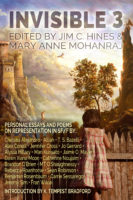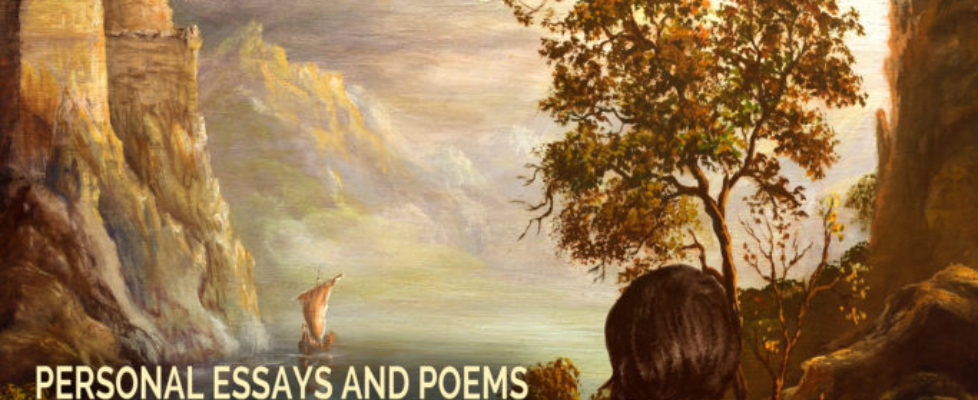Notes from the Meat Cage, by Fran Wilde
“It turns out that what I wanted wasn’t the story of a young woman coming to terms with her brace or her body … what I wanted was something to love.”
 Fran Wilde is one of the contributors to Invisible 3, which comes out on June 27 and includes 18 essays and poems about representation in science fiction and fantasy. You can preorder the collection at:
Fran Wilde is one of the contributors to Invisible 3, which comes out on June 27 and includes 18 essays and poems about representation in science fiction and fantasy. You can preorder the collection at:
Amazon | Kobo | Smashwords | Google Play
(It will be available for Nook and iBooks as well, but we don’t have those links yet.)
Any profits from the sale of the collection go to Con or Bust, helping fans of color to attend SF/F conventions.
As with Invisible and Invisible 2, the contributors to this third volume have shared work that’s heartfelt, eye-opening, honest, thoughtful, and important…not to mention relevant to so much of what we see happening in the genre today.
I hope you find Wilde’s essay as powerful as I did.
#
At twelve, I perfected the baggy clothes drape. I stood and leaned against walls rather than sitting. Leaning kept the bottom edge of the hard, white fiberglass brace from digging into my thighs and the top edge from pinching under my arms. Either or both would drag my clothes funny and ruin the effect. I was pretty careful, but one pat on the back or a joking poke at my ribs and thunk. Hip to collarbone, my identity was wrapped in a hard shell.
Other braces, before and since, were easier to hide if I wanted to hide them. Foot braces, worn at night, turned my feet in the right direction, and no one was the wiser. Their ugly cousins, the orthopedic shoes, went away by third grade. The current knee and wrist braces and all the bracing tape? Those disappear under sleeves and skirts. And they’re mostly soft, not hard.
But I’ve always identified with that thunk. Part of me has always been a brain rolling around in a cage—both the skin and bones cage that doesn’t behave, and the shells that try to help fix that.
Growing up, this sucked.
Worse, the available books I could identify with sucked too. Deenie? Once was fine, but everyone gave me Deenie as if there was nothing else. And there really wasn’t. I started leaving annotated pages of Deenie secreted around my doctors’ offices in protest.
The year before I was cast for that second brace, I found science fiction.
I realized early that I identified more with the ships I was reading about than their captains. Especially the brain ships. (I’m still incredibly partial to liveships like Farscape’s Moya, Bear & Monette’s The Lavinia Whateley (“Boojum”), and Aliette de Bodard’s mindships.)
It turns out that what I wanted wasn’t the story of a young woman coming to terms with her brace or her body (seriously it’s a fine story, but it didn’t fit me at all—or, rather, it fit me like a brace, constraining and awkward). What I wanted was something to love. I was listening for that familiar thunk on the hull; I just didn’t know it. That recognition that there was a mind inside a cage of muscle, bone, pain, fiberglass, and metal. The acknowledgement that a mind could do things—heroic things! Cool things!—even if the body rebelled.
The first time I read Anne McCaffrey’s short story “The Ship Who Sang,” I read that painful first line—”She was born a thing,” and the ensuing replacement of Helva’s body with something better, a brainship shell—and felt guilty that I had it easy in comparison, while being thrilled that the main character was female. At twelve, I didn’t quite grasp some problematic aspects of the story.* What I knew immediately was that “The Ship Who Sang” delighted me.
That delight stemmed from recognizing a part of myself in the story—a singer, an artist, a perfectionist, a twisted form, triumphant inside a hard, albeit fiberglass, shell.
I fell in love with Helva from the start, and never really let her go. She’s mine. My ship.
She was so much better than freaking Deenie.
Later, another story caught me up in similar ways, though, again, I didn’t realize why until a lot later. William Gibson’s “Winter Market” (Burning Chrome), features Max, a recording engineer, and Lise, a wunderkind artist about to go viral. Lise’s genetic disorder requires her to wear a full-body brace in order to survive, but this is faulty equipment too, so much so that the brace once trapped her starving and unable to move in a pile of garbage. Told from Max’s point of view, “Winter Market” opens with Lise’s escape to immortality: “It was like that the day her agents phoned to tell me she’d merged with the net, crossed over for good.”
In “Winter Market,” Lise creates something astoundingly beautiful and Max sees her for who she is when no one else does. I love the story. I thought I loved it because of what it said about art and dedication and rage; because of the connection between two people; because of how angry Lise was whenever anyone looked at her with anything approaching pity.
Lise is better than Deenie too.
But, as I said above, Lise is already gone by the time “Winter Market” begins, and my love for Gibson’s story has grown more complex and layered.
Lately, I’ve been arguing with Gibson in my head about Lise. (And, to a lesser extent, with McCaffrey about Helva.) Because Lise is a prop for “Winter Market.” She’s gone, and what she’s left behind and what she’s become are not Lise any more, in the narrator’s eyes especially. Because her tech cage failed her, maybe. Because her meat cage failed her too, probably. Because her mind needed to escape all that she was in order to fulfill what she was capable of.
I’m arguing about that now for a lot of reasons. First, because I can’t get out of my cage—none of us can—and second because I do not want to be gone. I want a world that lets me live, and love, and create, and be me, with whatever braces or tech I need. One that doesn’t stand in my way or expect me to disappear in one flaming act of creation. Gibson’s and McCaffrey’s stories helped me understand this, in their own ways.
So when I write characters like Djonn in Cloudbound and Horizon, or Lane in “Happenstance,” a short story coming out this summer in the FutureScapes anthology, I write them uncaged, even as I give them braces and tech to help support them. The cage I’m talking about is the story’s definition of who they are—where Lise is at one point garbage and the hole she leaves in the story, where Helva cannot be at all, unless her parents make her a ship. Djonn and Lane and others aren’t defined by their bodies and limitations; they have the tools to do their jobs and live their lives.
Sometimes people don’t notice my characters have disabilities because these characters are too busy living their lives.
I’m really very fine with that. I’m busy living my life too.
Even when the meatcage goes thunk.
_____
*And has been beautifully explored by readers and academics including Dr. Ria Cheyne, in “She was born a Thing, Disability, The Cyborg, and the Posthuman (Journal of Mondern Literature 36.3)”
***
Fran Wilde is the author of the Andre Norton- and Compton Crook Award-winning, Nebula-nominated novel UPDRAFT (Tor 2015), its sequels, CLOUDBOUND (2016) and HORIZON (2017), and the Nebula- and Hugo-nominated novelette “The Jewel and Her Lapidary” (Tor.com Publishing 2016). Her short stories appear in Asimov’s, Tor.com, Beneath Ceaseless Skies, Shimmer, Nature, and the 2017 Year’s Best Dark Fantasy and Horror. She writes for publications including The Washington Post, Tor.com, Clarkesworld, iO9.com, and GeekMom.com. You can find her on Twitter, Facebook, and at franwilde.net.






